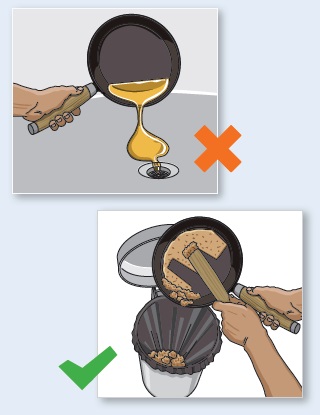Fats, oils and grease in your pipes can result in an expensive plumbing repair bill. Overflows and backups can also damage your home’s interior and threaten the environment.
What you can do
Follow these simple guidelines.
-
Cool and collect fats, oil and grease in a covered container and put them in a rubbish bin, add to compost, or dig into your garden.
-
Scrape pots and pans into your rubbish bin before rinsing and washing.
- Add a strainer to your sink to catch food scraps and other solids that can collect with any fats and create a blockage.

Restaurants and other businesses
Restaurants and other food-handling businesses are a significant source of fats, oil and grease. To prevent blockages, we recommend:
-
Cool and collect fats, oil and grease in a covered container and use a commercial collector to pick these up.
-
Use a commercial service to clean the filters in your ventilation hood.
-
Install a grease trap and have it commercially cleaned regularly to keep it working properly.
Resources for restaurants
Restaurants and food-handling businesses can display and distribute these to kitchen staff:
Don't pour fats, oils or grease down the sink, drain or toilet A3 PDF poster (574KB)
Do the right thing with fats, oils or grease A4 brochure in English with Mandarin (Chinese), Korean, Thai and Vietnamese translations (1.74MB)